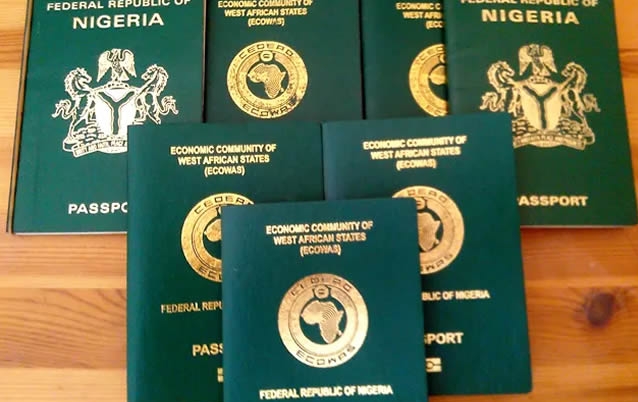
Nigerian international passports
A Locked Door Home: Why Scrapping Nigeria’s Visa-on-Arrival Hurts Diaspora Nigerians, By Chukwudi Ezeani
On May 1, Nigeria implemented its new Visa Policy 2025, a sweeping reform that replaced the familiar Visa-on-Arrival (VOA) process with an entirely digital system. From that date forward, all short-term visas must be processed solely through an electronic visa (e-Visa) platform. While the intent behind this move may be modernization and security, the effect has been exclusion, frustration, and a growing sense of disconnection—especially for Nigerians in the diaspora.
The new e-Visa system promises 48-hour processing through an online portal. In theory, it offers convenience and efficiency. But the reality for thousands of applicants is far less optimistic. The system is already overwhelmed with technical glitches, unclear instructions, and automatic rejections. Minor errors—like a passport scan that doesn’t meet format requirements or a misfilled form—result in denials without recourse. Unlike before, applicants cannot walk into Nigerian missions or consulates to seek help or apply physically. Embassies, once capable of processing or resolving these issues, are now reduced to referral centers for a digital system they do not control.
This rigid approach is particularly unfair to Nigerians who live abroad. Many of them hold foreign passports and therefore require visas to return to the country of their birth. Under the old regime, the Visa-on-Arrival option allowed them to travel quickly for funerals, weddings, urgent family needs, or even business ventures. Now, they face a system that assumes everyone is digitally literate, has a stable internet, and can complete complex forms online with zero error. These same diaspora citizens continue to contribute significantly to Nigeria’s economy through remittances and investments—yet are denied flexibility when it comes to accessing the nation they help sustain.
One wonders: what was so irreparably broken about the old visa regime that it couldn’t be fixed? Were the flaws—such as delays or misuse—not better addressed through reform, staff training, biometric integration, and digital verification tools? Rather than refine the VOA and physical application pathways, the Nigerian government has chosen to eliminate them completely, insisting on a one-size-fits-all digital solution. This policy move suggests haste, not foresight.
Security concerns have been cited to justify the shift. Authorities argue that the VOA was being misused by foreign nationals involved in activities ranging from criminal syndicates to economic displacement of Nigerians. But can anyone truly claim that digital-only systems prevent abuse? On the contrary, digital platforms—once mastered by the wrong hands—can become a smokescreen for deception. Well-crafted false identities, forged documents, and polished online profiles can easily pass through automated screening without raising red flags. By removing physical interaction and human checks, we risk creating a system that is easier—not harder—to manipulate.
It is ironic that while security is cited as the main reason for digital-only processing, the actual result may be greater vulnerability. In an age where cybersecurity breaches and digital identity fraud are on the rise globally, reducing visa scrutiny to mere document uploads is hardly reassuring. If anything, this mono-application system exposes Nigeria to those who understand how to exploit its blind spots—while excluding those who genuinely want to return home but cannot navigate an unforgiving interface.
And what about applicants who simply do not want to use digital platforms at all? Some travelers—especially the elderly, less tech-savvy, or those living in regions with limited digital access—prefer or even require physical, in-person application routes. In most advanced countries, from the United Kingdom to the United States, both options are available. You can apply online or through Visa Application Centres. You can speak with someone at the consulate. You can make corrections or get guidance in real time. Why should Nigeria be different?
Many countries—such as Kenya, Rwanda, the UAE, and Thailand—have embraced digital innovation while retaining Visa-on-Arrival or in-person application options. These countries understand that digital platforms are tools—not replacements for human systems. A smart system is one that includes both, offering flexibility without sacrificing security or accessibility.
The decision to make e-Visa the only route has effectively blocked many Nigerians in the diaspora from visiting their families, managing their businesses, or fulfilling cultural and social obligations. Every short-term visa—be it for business, tourism, family visit, media work, or transit—must now pass through the same narrow digital door. No exception. No alternative. And no backup. That’s not modernization; it’s exclusion by design.
Even in sectors far more digitized than immigration—such as banking—dual systems are the norm. Banks offer mobile apps and ATMs, yes, but they also retain physical branches, cheque books, and customer service lines. Because institutions know that people have different needs, preferences, and access levels. Shouldn’t Nigeria’s immigration system reflect the same principle?
There is a way forward. The e-Visa system can continue—but it should exist alongside reformed physical application pathways. The previous VOA mechanism could have been improved with better checks, biometric records, and real-time border vetting, rather than being discarded altogether. Dual systems are not a sign of inefficiency; they are a sign of inclusiveness and resilience.
For now, what should be a simple matter of coming home has become an ordeal. And for many Nigerians abroad, it now feels like Nigeria has closed the door—digitally.
